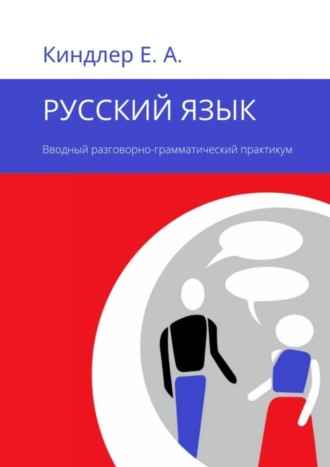
Полная версия
Русский язык. Вводный разговорно-грамматический практикум

Русский язык
Вводный разговорно-грамматический практикум
Евгений Александрович Киндлер
Дизайнер обложки Валерия Александровна Соколова
© Евгений Александрович Киндлер, 2022
© Валерия Александровна Соколова, дизайн обложки, 2022
ISBN 978-5-0056-1268-7
Создано в интеллектуальной издательской системе Ridero
Предисловие
Вводный разговорно-грамматический практикум
Основу курса составляет метод, которым пользуется большинство полиглотов: освоение базовых грамматических структур, а затем интенсивный набор наиболее частотной лексики, соответствующей уровням начального, бытового, беглого и свободного общения, отработка коммуникативных навыков.
Цель курса: обеспечить логико-интуитивное погружение в язык.
Реализация данной цели создаёт базу для последующего набора необходимых лексико-грамматических элементов посредством аналитического чтения и аудирования.
Курс базируется на следующих принципах:
1. Освоение базовых лексико-грамматических элементов языка с учетом принципов коммуникативной последовательности, данные элементы даются в ограниченном объёме, достаточном для порождения законченных речевых высказываний на определённую тему.
2. Понимание логики иностранного языка посредством аналитического сопоставления с родным, использование подстановочных таблиц.
3. Закрепление структурных алгоритмов, позволяющих осуществлять необходимую диалогическую и монологическую коммуникацию в наиболее типичных ситуациях повседневного взаимодействия.
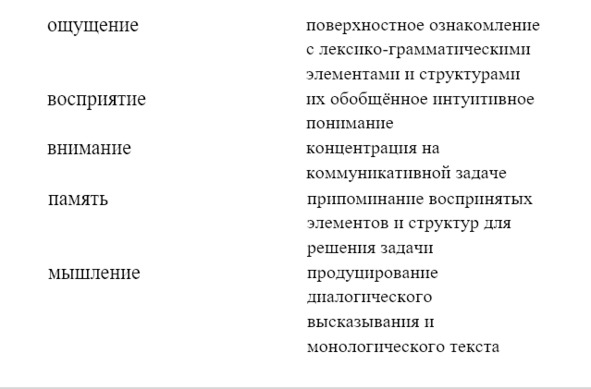
В курсе учитываются особенности когнитивных процессов психики, таких как ощущение – восприятие – внимание – память – мышление. Исходя из этих особенностей выстраивается логика подачи материала на каждом уроке. Основным когнитивным процессам соответствуют следующие виды учебной деятельности:
Достигнутый уровень владения после прохождения курса А1+.
Урок 1. Род существительных. Национальность. Lesson 1. Gender of nouns. Nationality
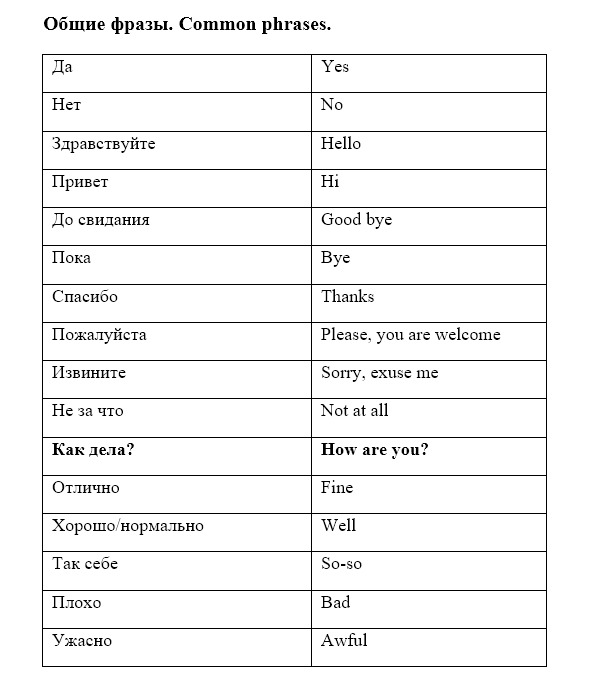
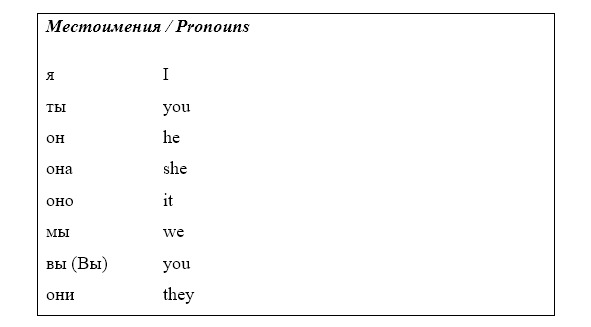
The pronoun ты is used in addressing children, members of the speaker’s own family or his close friends. The pronoun вы (Вы) can be used with respect to one person or several persons:
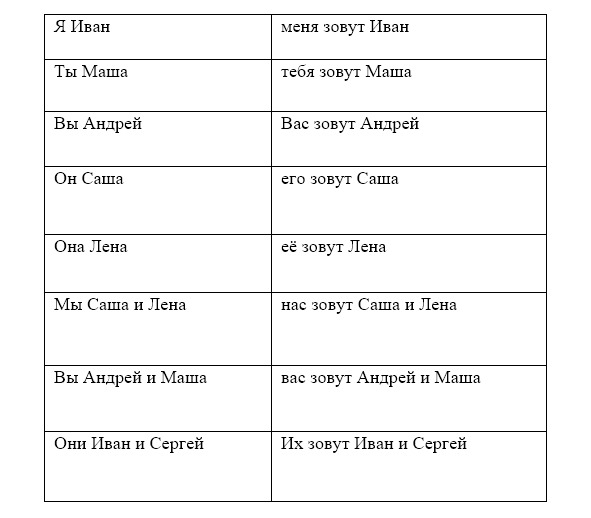
Как тебя (Вас) зовут? – What is your name?
Упражнение 1
What is your name
Меня зовут…
Упражнение 2
Meet and introduce your friends. Use expressions его/её зовут…
Диалоги:
– Привет. Меня зовут Саша. А тебя как зовут?
– Меня зовут Лена.
– Я очень рад1 познакомиться.
– Я тоже рада познакомиться.
– Здравствуйте. Меня зовут Иван. А вас как зовут?
– Меня зовут Сергей.
– Очень приятно познакомиться!
– Мне тоже очень приятно!
Упражнение 3
Write in Russian your name and surname. Spell your name so your friend writes it down. In Russian, the first name is pronounced, and then the last name.
In the official styles, the patronymic (father’s name) is also used together with the name. For example, Alexander (name) Sergeyevich (patronymic) Pushkin (last name). There are also full and short names. In an informal style, short ones are most often used.
For example, Elena/Lena, Ivan/Vanya, Yelizaveta (Elizabeth) /Lisa. Almost all male names in full form end with a consonant (exception, Nikita, Ilya), female with «a» or «я» vowels (exception Lyubov’). Several names can be used for both men and women. For example, Alexander/Alexandra, Eugeniy (Eugene) /Eugenia, Valery/Valeria
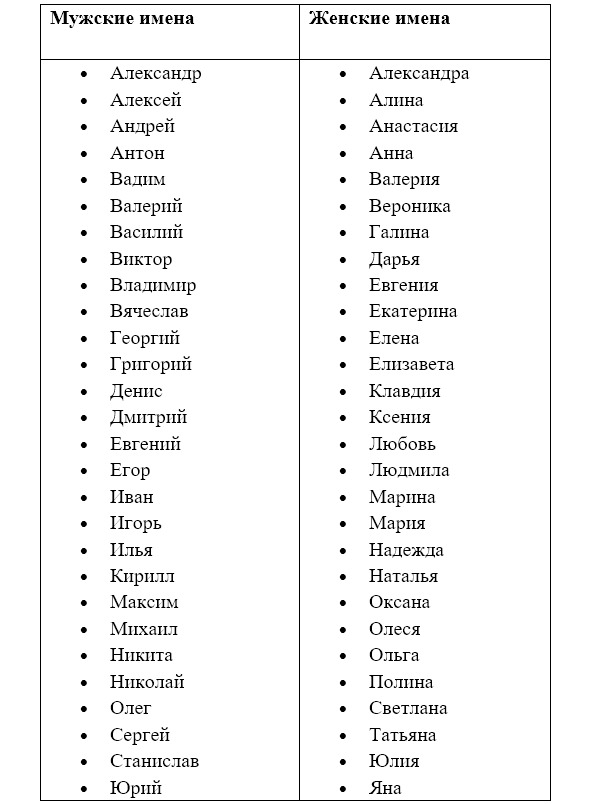
Упражнение 4.
Indicate whose name is male or female. Полина Олеся Алексей Ксения Валентина Анатолий Екатерина Елена Андрей Юлия Яна Антон Артем Оксана Вадим Валентин Анна Валерий Василий Виктор Виталий Владимир Вячеслав Людмила Маргарита Геннадий Клавдия Георгий Ольга Григорий Даниил Денис Дмитpий Евгений Александра Егор Любовь Иван Игорь Илья Кирилл Алина Алла Анастасия Максим Наталья Нина Михаил Вероника Виктория Никита Карина Николай Олег Галина Дарья
Names of countries in Russian are consonant with their names in European languages. Note that the nationalities of men end with a consonant (the majority has an ending – ец), women with vowels (the ending is -ка). The plural has endings ы or и.
Упражнение 5. What is your nationality?
Например,
– Я русский.
– Я русская.
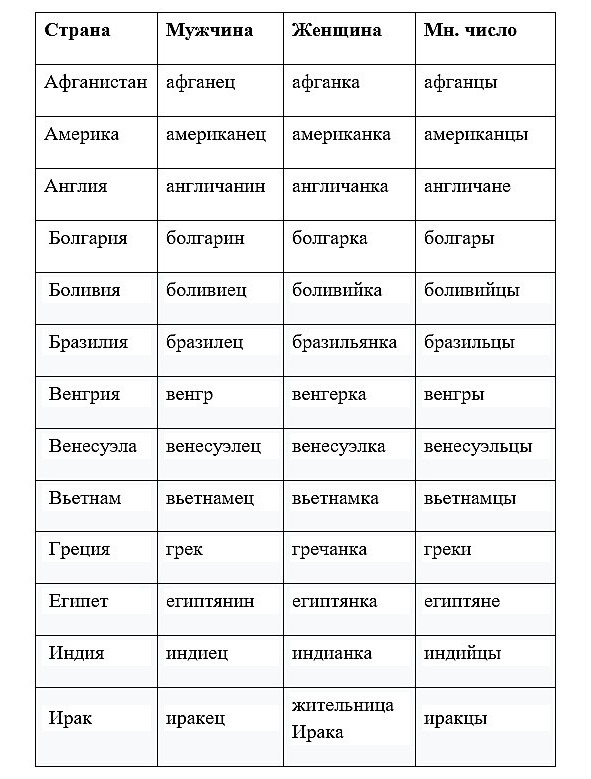
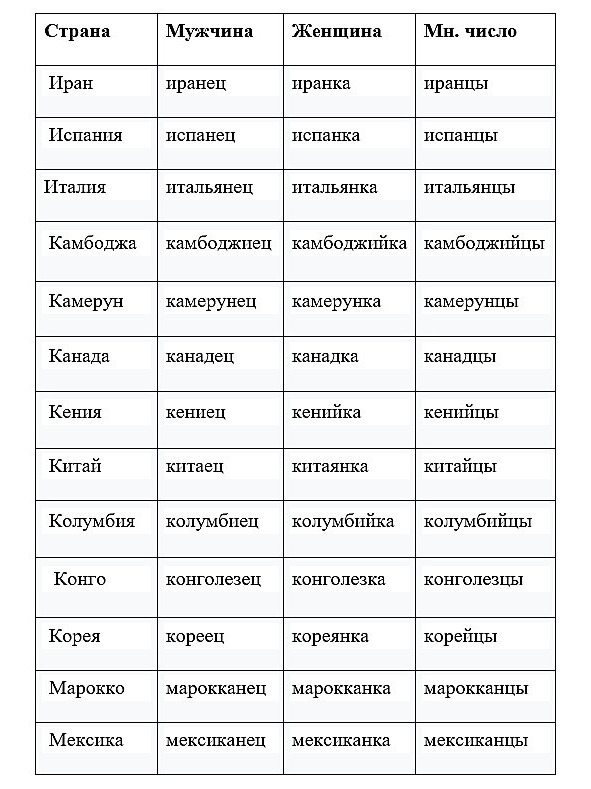
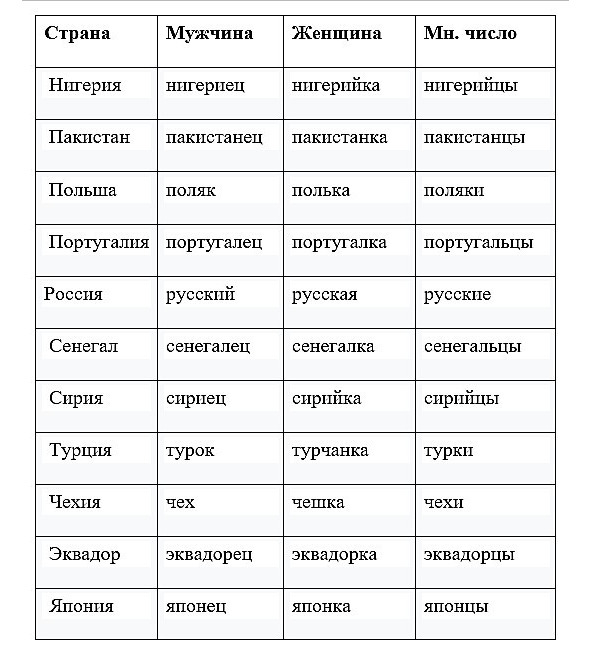
Упражнение 6. Introduce your friends by composing similar dialogues
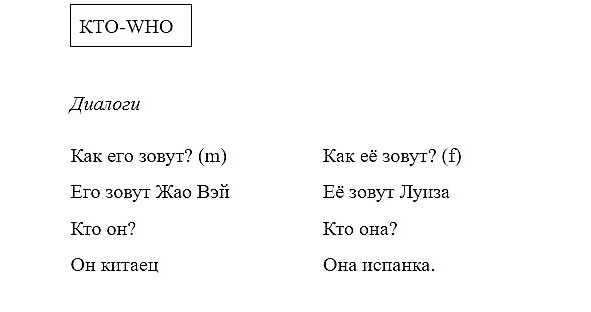
Упражнение 7. Find the meaning of the following words in the dictionary
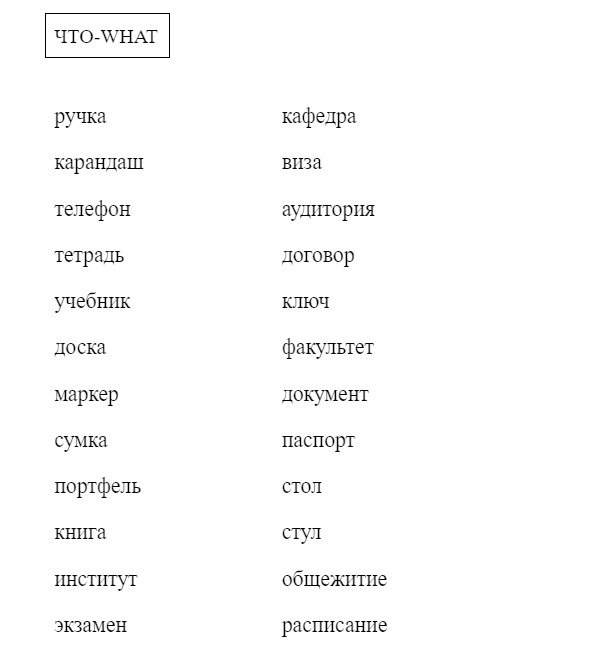
Запомните:
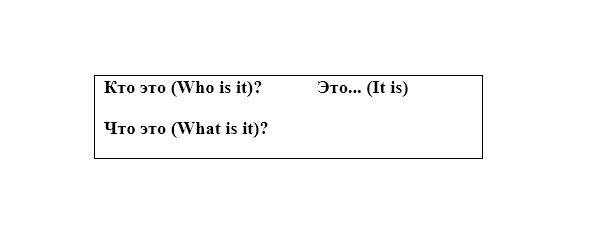
Упражнение 8. Determine the gender of these words
Russian nouns have gender. There are three genders: masculine, feminine and neuter. The gender of animated nouns (persons or animals) is generally determined by their sex. The gender of unanimated nouns can be discerned only by endings:
masculine – consonant or й
дом, музей,
feminine — а, я
страна, фамилия,
neuter – о, е
окно, упражнение
Note. – Nouns with – ь may be either masculinte or feminine. The ending must be memorized
словарь, преподаватель – masculine
национальность, тетрадь – feminine
Упражнение 9. Write the five items you have
In Russian there is a verb «быть» (to be). Derivative of it is «есть», but it is not used as in English. They speak Russian without using the verb «to be» in sentences like «I’m a student», «I’m Russian»: я студент, я русский, not «я есть студент».
«Есть» is used to express the idea of possession. It refers to «to have» in combination with the preposition у and personal pronoun in the indirect case.
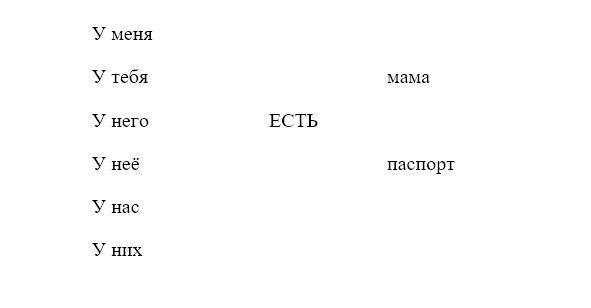
Урок 2. Числа
Lesson 2. Numerals
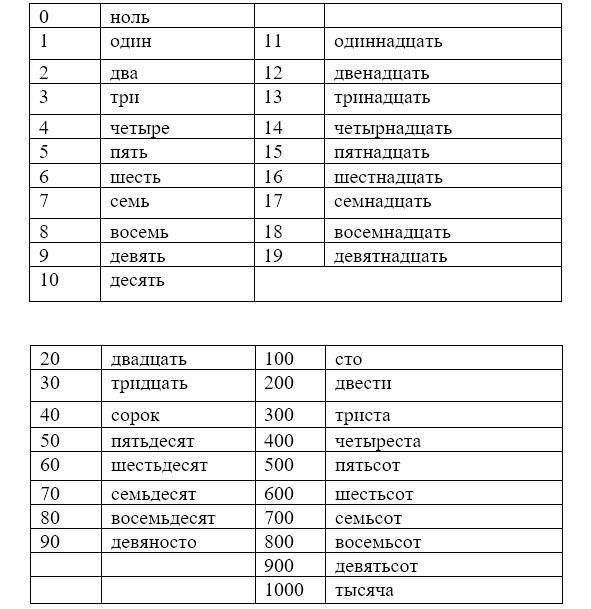
Note:
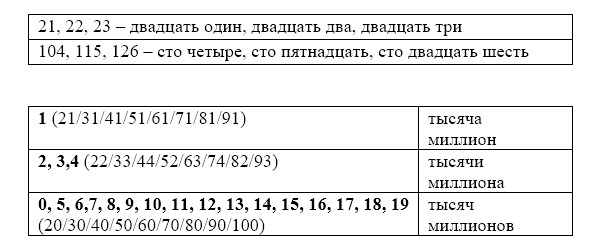
In Russian there are cases. That is wy «thousand» and «million» get different endings after definite numbers. It also conserns to the nouns after these numbers.
Упражнение 1. Exchange phone numbers
Упражнение 2. How old are you? Make similar dialogs.
– Сколько тебе (Вам) лет?
– Мне 21 год /23 года/19 лет
Упражнение 3. Say each other’s age
Ему 24 года (masculine)
Ей 24 года (femine)
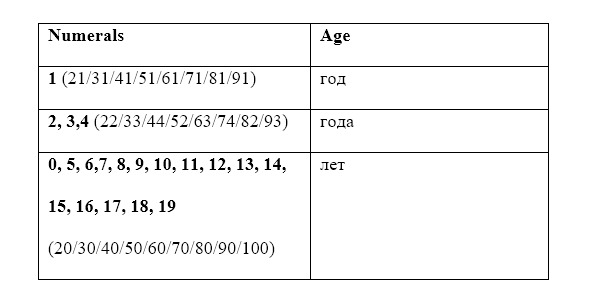
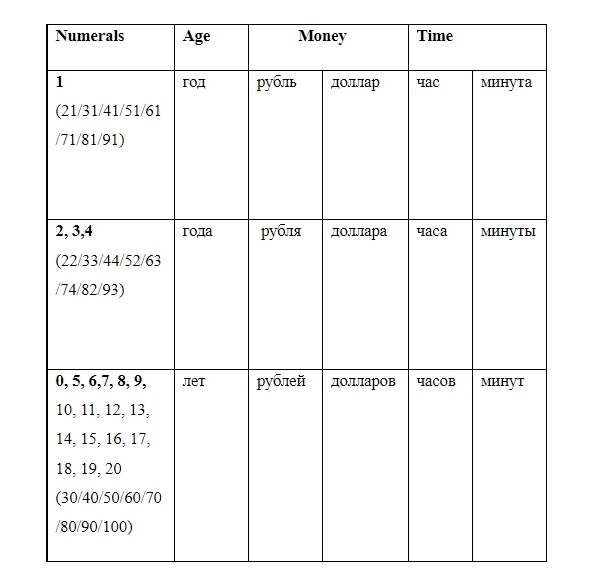
Упражнение 4. How much do these products approxmately cost in Russia and in your country?
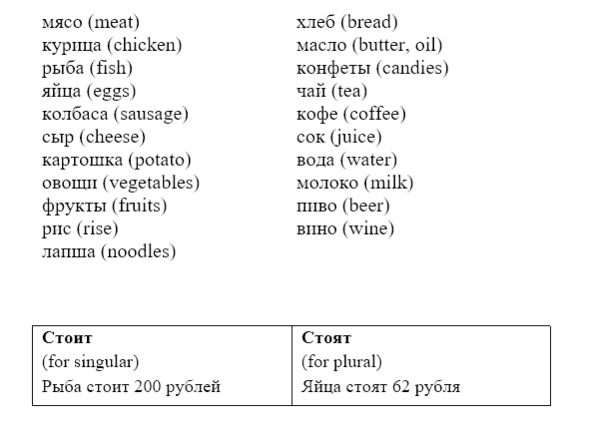
Упражнение 5. Say your address
Мой адрес – Улица (Street) Ленина
Дом (house) – 5
Квартира (flat) – 13
Упражнение 6. What time is it2?
– Сколько времени?
– 11:23 (Одиннадцать часов, двадцать три минуты)
– Который час?
– 20:17 (Двадцать часов (восемь часов вечера), семнадцать минут)
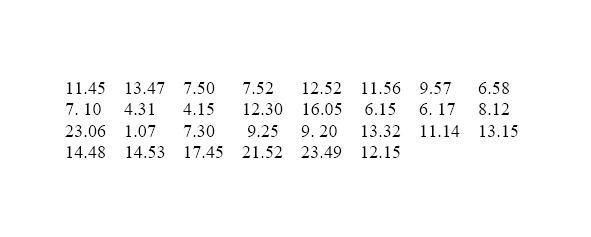
Упражнение 7. Read the numbers
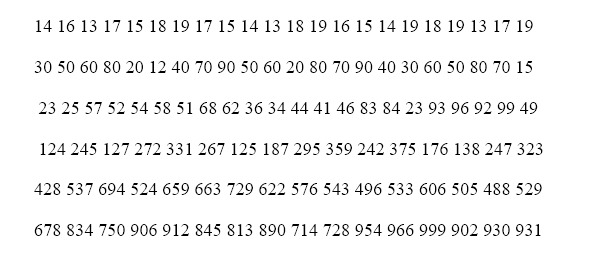
Упражнение 8. Write and read numbers
1018, 2016, 2046, 3084, 3023,4193, 4259,5342, 5475, 6554, 6766, 8899,9906
Урок 3 Личные, указательные и притяжательные местоимения Члены семьи, профессии. Lesson 3. Personal, demonstrative and possessive pronouns. Family members, professions
As you know, there are six cases in Russian: nominative, genitive, dative, accusative, instrumental and prepositional. Pronouns also vary in cases. In this tutorial, we’ll talk first about nominative, dative, accusative, and then about genitive. Consider for example the pronouns I. I’m nominative (who), me accusative (whom), me dative (to whom). Compare the following sentences in English and Russian.
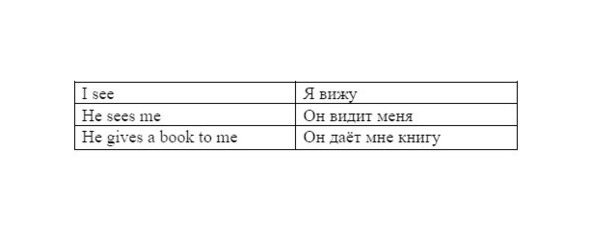
For subject is used the nominative case. The accusative is used if somebody or something is not subject but object. The principal meaning of the accusative is to designate a person or thing to whom or which and action is being done. The dative case is used in Russian for the indirect object of a sentence. The indirect object is normally the person who receives the direct object.
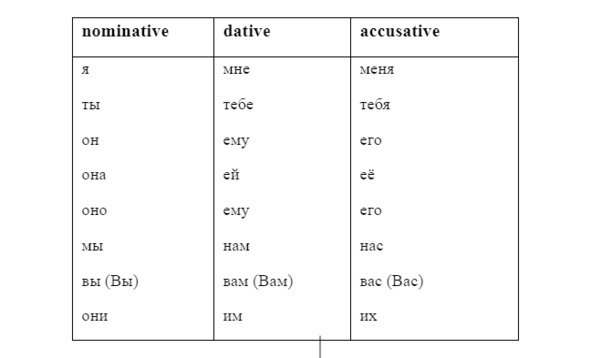
We have already said that the expression у меня есть means I have. This is a preposition, after which the genitive is used. Personal pronouns in the genitive case except он, она, оно have the same forms as in the accusative case. The primary meaning of the Russian genitive case is to show possession.
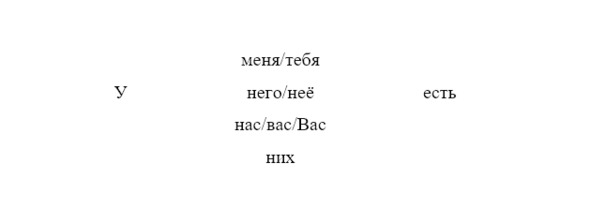
Упражнение 1. What family members do you have
Члены семьи (Family members)
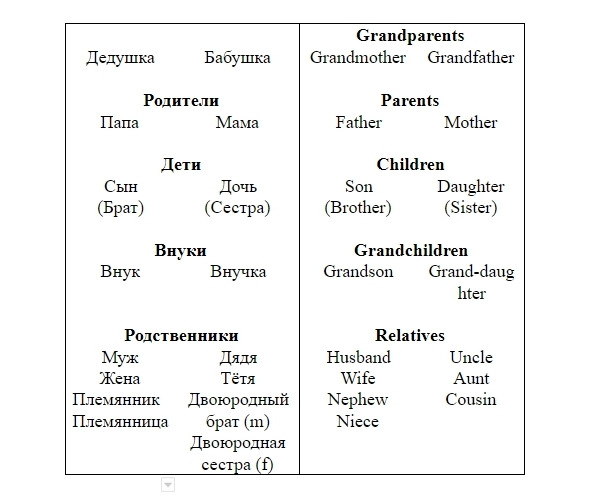
Grandparents3
У меня нет… – I do not have…4
Дедушки
Бабушки
Родителей
Папы
Мамы
Детей
Сына (Брата)
Дочери (Сестры)
Внуков
Внука
Внучки
Родственников
Мужа
Жены
Дяди
Тёти
Племянника
Племянницы
Двоюродного брата
Двоюродной сестры
Упражнение 2. Tell about your family using the table.
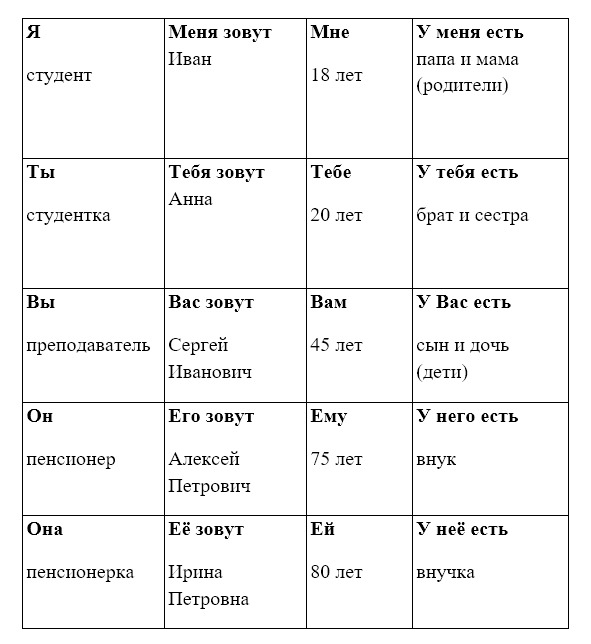
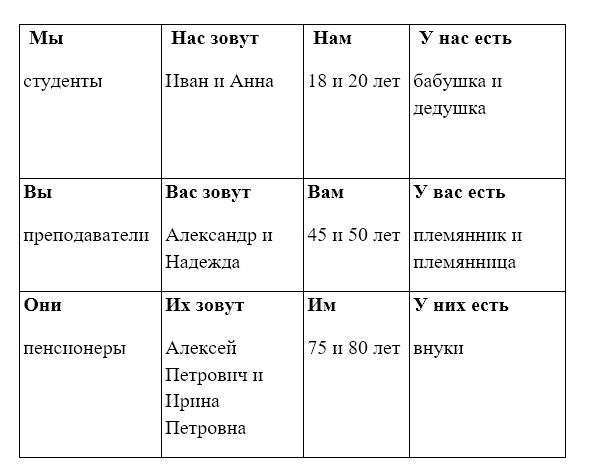
In the Russian language there are possessive pronouns. Possessive pronouns are a group of words indicating a sign of an object by its affiliation (something to someone) and answering questions whose (чей). They can be masculine, feminine, neuter or plural. The gender and number of possessive pronouns is determined by the noun in front of which they stand. For example: мой папа (m), моя мама (f), моё упражнение (n), мои родители (pl).
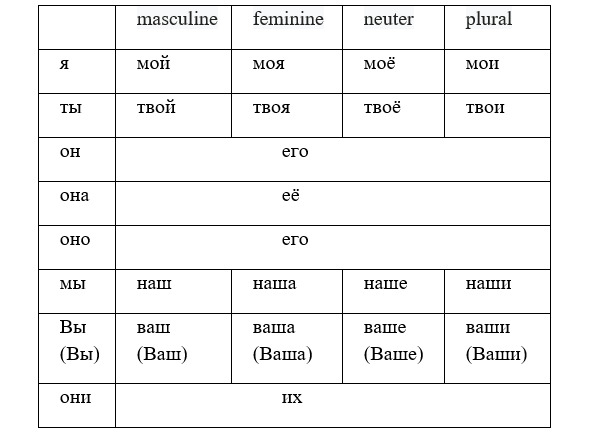
Упражнение 3. Indicate the possessive pronoun according to the gender and number of the noun.
For example,
мой, твой, его, её, наш, ваш папа (m)
моя, твоя, его, её, наша, ваша мама (f)
Члены семьи – Family members
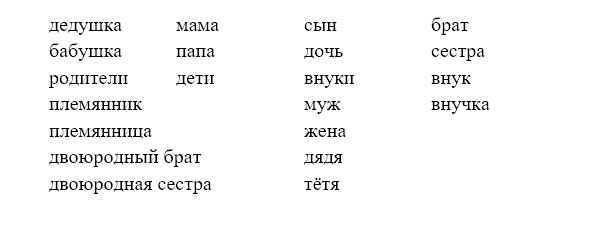
Учёба – Study
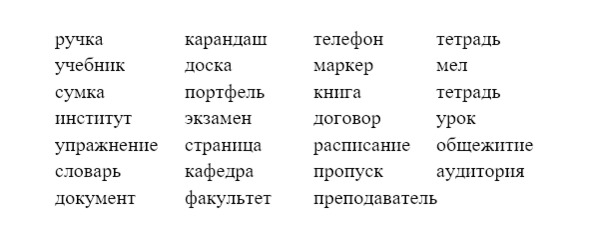
Еда и напитки – Food and drink
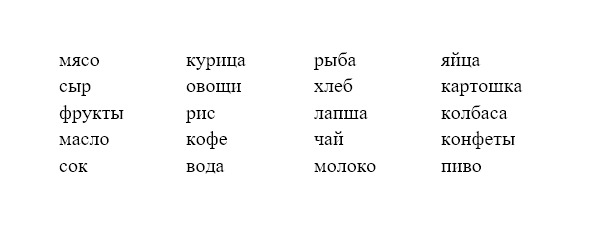
Профессия (profession)
Compare these words. You can see they’re alike. There are many borrowed and international words in Russian. English words with the ending «sion» are used in Russian with the ending «сия».
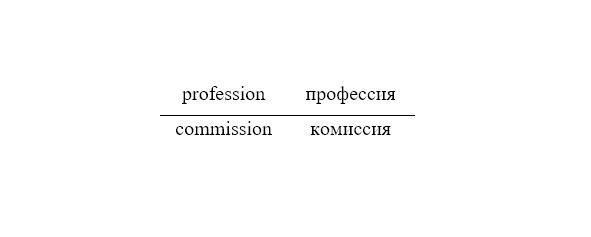
Nouns with the ending «tion» have the endings «ция».
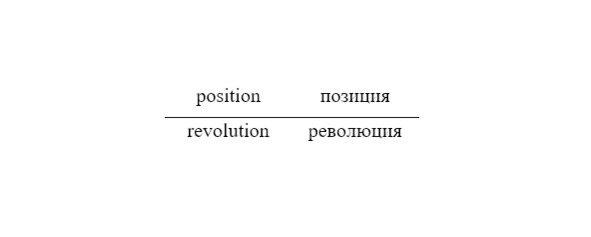
Of course, the meanings of such words in English and in Russian are not always identical.
Complection – color of skin.
Комплекция – body type.
Nevertheless, you already know several tens of thousands of such words, applying this scheme.
Кто ты (Вы, он, она) по профессии?
Я учитель (по профессии).
For some professions one word is used in Russian. For others different words are used depending on the gender.
!Учитель is used for the teacher at school, преподаватель is used for the teacher at university.
Упражнение 4. Make dialogs like these
– Кто твои родители по профессии?
– Мой папа по профессии инженер, а мама учительница
– У тебя есть братья и сёстры?
– У меня есть только брат.
– А кто он по профессии?
– Мой брат бизнесмен.
!Этот/ тот – this/that
Упражнение 6. Indicate the demonstrative pronouns according to the gender and number of the noun.
For example, этот, тот (папа)
эта, та (мама)
Урок 4. Глаголы несовершенного вида настоящего времени. Особые случаи глаголов
Lesson 4. Imperfective verbs of the present tense. Special cases of verbs
All verbs in Russian have an initial form with standard endings. Most verbs have an ending – ть. Less often – ти and very rarely – чь. In Russian – like in many other languages – a verb changes its ending for persons.
Дела -ть (to do)
я дела – ю
мы дела – ем
ты дела – ешь
вы (Вы) дела – ете
он/она/оно дела – ет
они дела -ют
You can see. To conjugate a verb, you need to replace the ending ть (ти, чь) with the others. There are 6 endings in the present tense. There are two groups of conjugations of verbs:
First conjugation – verbs ending with ать, ять (читать, объяснять)
Second conjugation – verbs ending with еть, ить (смотреть, учить)
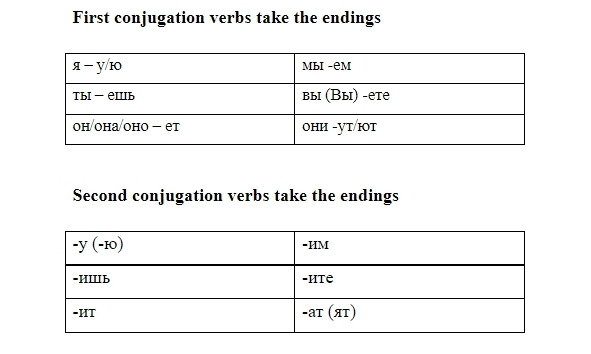
This is a general rule. There are exceptions and special cases that you must just remember. Let’s start with the first group of verbs It is important to mention is that after 8 letters (к, г, ш, ж, щ, ч, х, ц) we don’t write the endings: -ю, -ют. We use the endings -у, -ут instead.
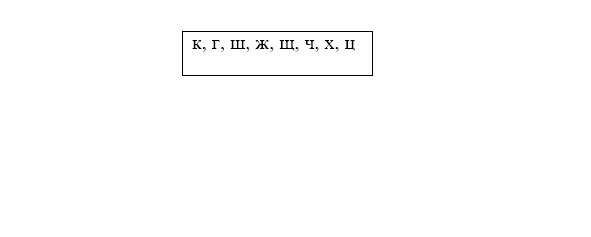
Понимать
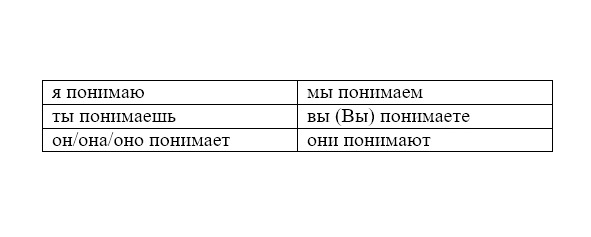
Гулять
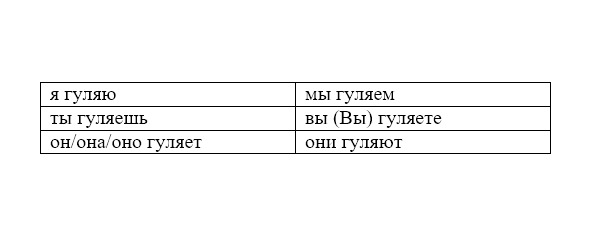
Упражнение 1. Conjugate the verbs of the first conjugated group in the pattern
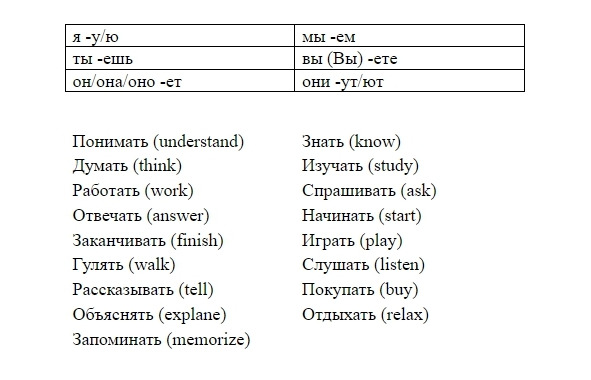
Second conjugation verbs (еть, ить, ти)
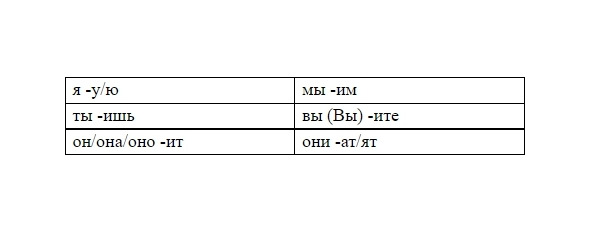
After 8 letters (к, г, ш, ж, щ, ч, х, ц) we don’t write the endings: -ю/ят. We use the endings -у, -ат instead.
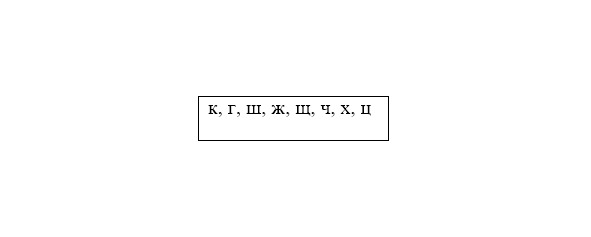
Говорить – speak
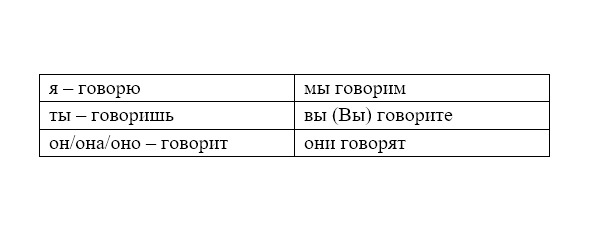
Смотреть – look
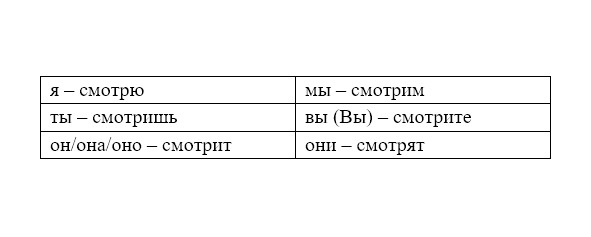
Учить – learn (what) or teach (whom)
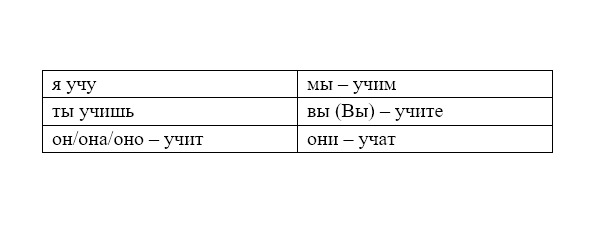
In Russian there are affirmative (ты говоришь), interrogative (ты говоришь?) аnd negative sentences (ты не говоришь).
A direct question is asked only with the help of intonation, the word order does not change, and auxiliary verbs are not used. If there is a question word, it is usually at the beginning of the sentence. Negation is formed through the addition of particles not before the verb.
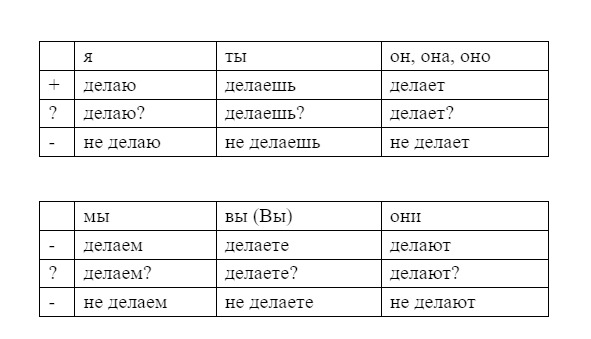
!Делаешь? – In Russian, there is a second way of asking questions with verbs: Делаешь ли ты?
The verb comes first, after it the particle ли, and then the pronoun or noun. This method is similar to the form of an indirect question in English. Like: She asked if he makes – Делает ли он?
Упражнение 2. Conjugate the verbs of the second conjugated group in the pattern.
говорить, смотреть, учить, помнить
Special cases of verbs:
First conjugation verbs
– авать/овать (they are replaced with the same endings)
Давать, рисовать, фотографировать, использовать, узнавать, подавать, сдавать, вставать, преподавать.
Рисовать
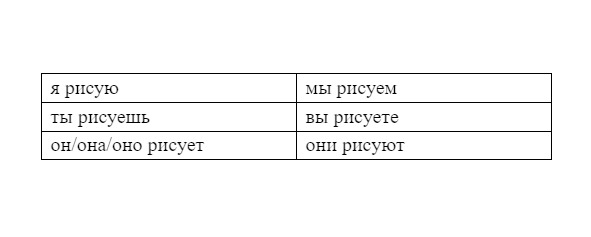
Second conjugation verbs
готовить, любить
In the first singular form (Я) there is alteration of consonant in the stem —
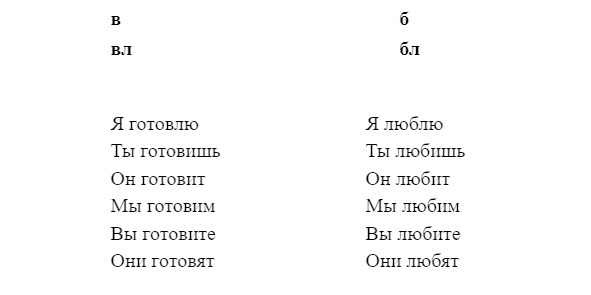
However, there are in Russian a lot of verbs that can refer to both 1 and 2 the second conjugation, exceptions and special cases. Notice some of them.
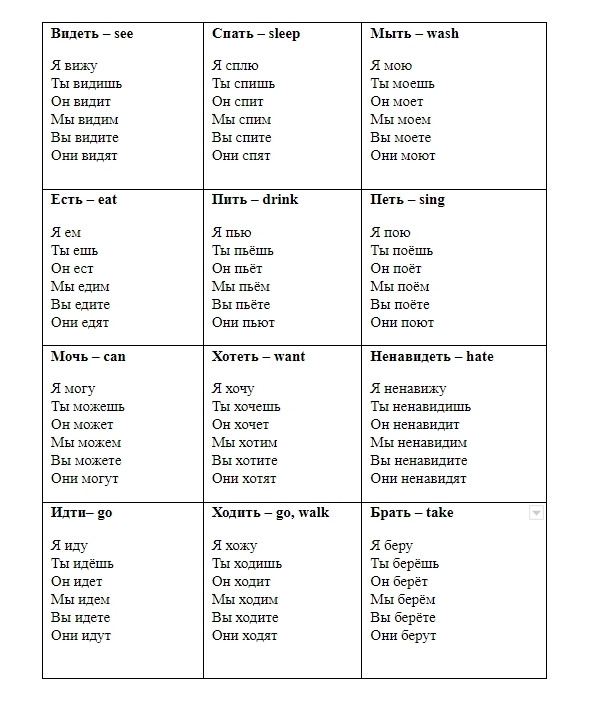
!Идти – The difference between the verbs идти and ходить is described in the lesson 10.
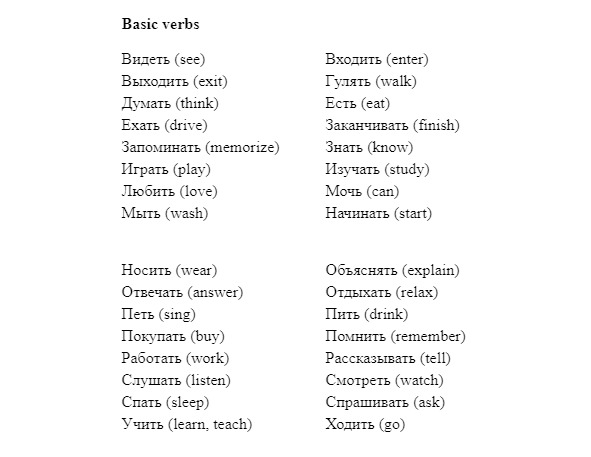
Упражнение 3. Conjugate the verbs
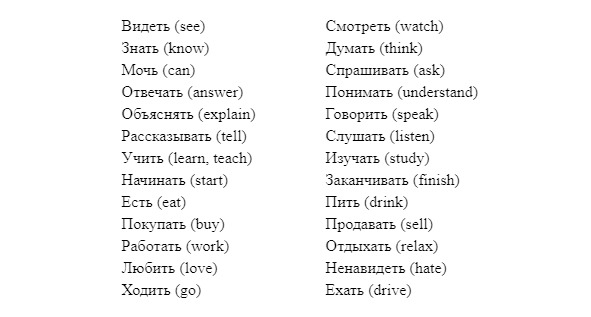
Упражнение 4. Insert verbs in the present tense instead of dots.
Читать
Я… текст. Он… правильно. Ты… медленно. Вы… правильно. Мы… письмо. Они… стихи.
Гулять
Вечером она… в парке. Когда ты …? Я не… днем. Мы… по городу. Где вы …? Студенты… после занятий.
Говорить
Когда он …, я слушаю. Как она… по-русски? Мы не… по-русски. Они… правильно. Студент… это слово неправильно. Преподаватель… медленно.
Учить
Мы… новые слова. Я… русский язык. Они… диалог. Ты… грамматику. Вы… текст.
Упражнение 5. Write suitable pronouns.
…работаешь на рынке?
…говорит правильно.
…гуляю в парке.
…отдыхаем после занятий.
…помнишь, как её зовут?
…обедаете дома?
…читаешь новый журнал?
…не понимаю тебя.
…переводим текст.
Урок 5. Я и моя семья. Вопросительные слова. Сочинительные союзы.
Lesson 5. Me and my family. Question words. Composing connectors
Упражнение 1. Translate into Russian
1. Who is it? 2. What is it? 3. Where is it? 4. What do you do? 5. Where do you study? 6. Where do you work? 7. Where are you from? 8. Where does she live? 9. How long do you live in Russia? 10. Where do you live? 11. How long do you learn Russian? 12. What do you say? 13. What do you write? 14. What do they listen to? 15. How old are they? 16. Do you eat meat? 17. Do you understand the text? 18. Who asks? 18. Why does she learn Russian? 19. What’s your name? are you? 20. How much costs the book?
Упражнение 2. Formulate your own questions for each other. Сoordinating Сonjunctions
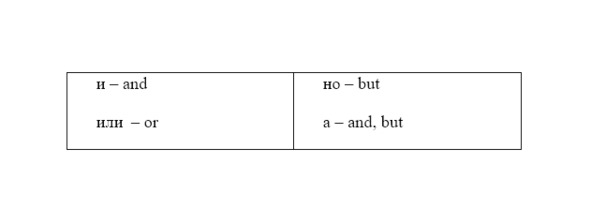
и
Я знаю русский и английский язык
Я читаю и пишу упражнение
или
Я работаю или отдыхаю
Я пью чай или кофе
но
Я пью чай, но не пью кофе
Я понимаю, но не говорю по-русски
а
Я знаю русский, а она знает английский
Я работаю, а он отдыхает
The conjunction но means but in English. It́s always related to a big contrast between the two parts of a sentence!
We use the conjunction a when therés no strong conflict between the parts of a sentence. It́s only additional information. This is a milder form of contrast. It may also have a connective value.
Упражнение 3. Make two sentences with each conjunction.
Упражнение 4. Read the texts
Words to text:
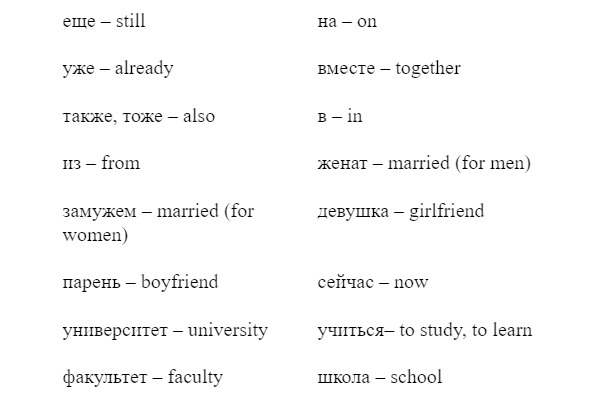
Привет. Меня зовут Алексей и мне 25 лет. Я журналист. Я не женат, но у меня есть девушка. Ее зовут Елена. Ей 23 года. Она экономист.
Привет. Меня зовут Настя. Мне 20 лет. Я студентка, я учусь5 в университете, на факультете лингвистики и ещё не работаю. Я не замужем, но у меня есть парень. Его зовут Андрей, ему 21 год. Мы вместе учимся.
Здравствуйте. Меня зовут Мария и мне 35 лет. Я из России. Я учительница. Я замужем. Моего мужа зовут Иван. Он полицейский. У нас есть дети. Моего сына зовут Дмитрий, ему 7 лет. Мою дочь зовут Маргарита, ей 3 года.

